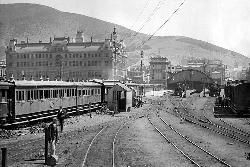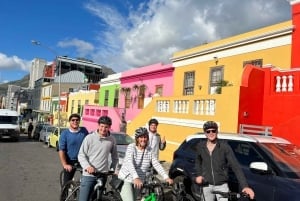Getting around Cape Town
Cape Town Station is a large, recently renovated station that caters for most public, mass and long-haul transport needs throughout the city and country. Upstairs is the main mini-bus station, while the main bus terminus is just across the road on the Grand Parade. There are new MyCiti bus stops and stations going up around the city, with the main station located at the nearby Civic Centre, while there are a number of metre cab companies available to ferry you directly to and from your destinations throughout the city. While public transport is often considered by locals and tourists to be unreliable and unsafe, this is not always the case. Millions of South African's make use of these services every year, and if approached in the right manner can serve some, or all, of your transport needs in a uniquely South African manner.
Cape Town City Railway Station is the main railway station of Cape Town, and it is located along Adderley and Strand Streets, next to the Grand Parade, near the Castle of Good Hope and the City Hall, in the centre of Cape Town City Bowl. Metro Rail trains are generally safe to use, however there have been reports of muggings and petty theft: remain vigilant at all times, keep valuables concealed, and avoid riding alone in empty carriages and at off-peak times.
Click here for the Cape Metrorail transport map. The latest Metrorail schedules are available here.
Transport arriving and departing from Cape Town Station:
• The luxurious Blue Train and Rovos Rail
• Shosholoza Meyl
• Metrorail commuter rail service for Cape Town and its surrounding areas
• Greyhound Bus
• SA Roadlink Bus
• Intercape Intercity Bus Liners
• Translux
MyCiTi is a new rapid bus transport initiative launched by the City of Cape Town. A number of world-class busses service a range of routes throughout Cape Town and outlying regions, including a dedicated shuttle that runs to Cape Town International Airport every 20 minutes.
New routes have recently been launched servicing much of the city, with regular stops throughout Cape Town and a number of outlying regions. These include:
- The main trunk route between Table View and the Civic Centre in the centre of Cape Town city
- Feeder bus services in Table View, Blaauwberg, Parklands and Big Bay
- A loop bus servicing Gardens, the Civic Centre and the V&A Waterfront in the Cape Town city centre
Commuters wishing to use the MyCiti busses require a MyConnect card, which can be recharged at the Civic Centre, and an increasing number of stores and locations around the city. The MyConnect card is not required to catch the Cape Town International airport to Civic Centre bus - tickets for these busses are available at the relevant stations. Click here for more information on MyCiti schedules, routes and fees. The map below outlines the latest MyCiti bus routes:
The city’s main mini-bus taxi rank also terminates from Cape Town Station, and "taxi’s" are available to many destinations for just a few Rand. Most fares start at about R4, and seldom go higher than R10.
- Sea Point and Camps Bay taxis operate from Strand Street.
- Taxis to the City Bowl, including the suburbs of Vredehoek, Tamboerskloof and Gardens, operate from next to the City Library at City Hall.
- Taxis to Mitchell’s Plein, Belville, Plumstead, Gugulethu, Langa, Khayalitsha, Tableview and Tokai can be found at the main taxi rank – which is above the station building.
Mini-bus taxis are generally safe to use, and can be a fascinating and entertaining way in which to get to your destination. Thousands of locals use this as their principle means of transport every day, however there are some taxis on the road that are poorly maintained and driven. As such it is important to be selective when choosing to travel by taxi. When in doubt, ask other travellers, drivers, or vendors for assistance - they're always willing to give you information necessary to make your journey as hassle-free and safe as possible.
Metre Cabs
There are a number of companies offering private taxi services throughout Cape Town. While the majority offer a reputable and safe alternative to driving or public transport, you will no doubt encounter illegal operators or cowboys patrolling the city's streets, particularly at night. These taxis seldom operate with accurate metres, if they have them at all, and prefer to negotiate fares before departure. While many are hardworking businessmen who offer services cheaper than registered taxi companies, your safest bet is to contact a reputable company directly for a pickup, who'll typically charge around R10 per kilometre. We recommend Excite Taxis for longer trips, and Rikkis for inner-city trips, however if in doubt your hotel will be able to offer advice.
Car rental / hire
The easiest way to get around Cape Town is to hire a car, especially if you intend to visit the city's outlying regions like the winelands or Cape Point. It's often more expensive than using the methods above, but being able to travel around the city under your own steam will make for a more enjoyable experience. Most major car hire companies have a presence in Cape Town, and many operate directly from Cape Town International airport for convenient pickup and dropoff. A number of airlines also offer discounts with specific car rental companies, so keep a lookout in your inflight magazines for more info.



















